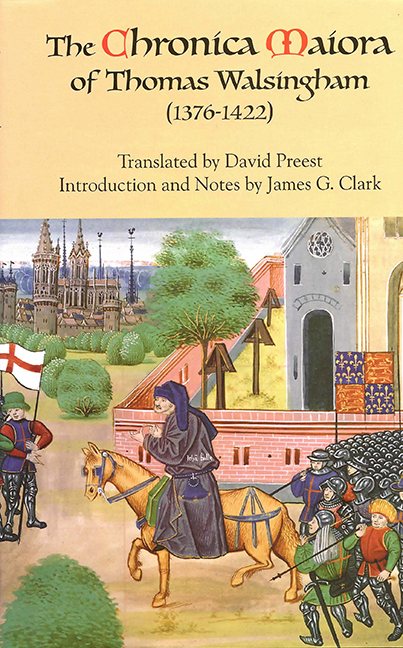Introduction
Published online by Cambridge University Press: 24 October 2017
Summary
The chronicle compiled by Thomas Walsingham, monk of the Benedictine abbey of St Albans, is one of the most valuable and vivid narrative histories to survive from later medieval England. No other author produced such a detailed account of the events of his own time over so long a period; Walsingham continued to compile his chronicle for forty-six years, from the closing months of the reign of Edward III until shortly after the sudden death of Edward's greatgrandson, Henry V, in August 1422. In contrast to many of his contemporaries, Walsingham's chronicle was also a completely independent narrative, founded for the most part on first-hand reports from a host of high-profile informants. He used documents sparingly, but as precentor of his monastery he understood the power of written records and those examples he did choose to transcribe are among the most significant royal and papal acta of the period and in several cases they are preserved uniquely in his text. He did not borrow from other chroniclers although they undoubtedly borrowed from him. In factWalsingham's chronicle contains a number of incidents and insights that are not recorded in any other contemporary source. It is largely to him that historians owe their knowledge of the course of key events such as the peasants’ revolt, the appellant crisis and the conquest of Normandy and – perhaps more especially – their understanding of the character of the kings: the dissipation of the elderly Edward III, the brittle, unpredictable personality of Richard II and the transformation of Prince Henry of Monmouth into the mighty Henry V.
Walsingham was also one of the only English chroniclers in this period to record in detail events in continental Europe. The opening of the papal schism and the resumption of the Anglo-French conflict projected the European powers into a period of profound political instability. France descended into civil war. Portugal and the Spanish kingdoms suffered dynastic struggles. The Low Countries became a battleground as Burgundy, England and the counts of Flanders contended for control of their burgeoning cities. Meanwhile a fugitive Roman pope could find no permanent sanctuary in the Italian peninsula as papal authority fast evaporated. Writing at some distance from these events but with a watchful eye for detail,Walsingham presents a unique if partisan perspective on the European scene.
- Type
- Chapter
- Information
- The Chronica Maiora of Thomas Walsingham (1376–1422) , pp. 1 - 22Publisher: Boydell & BrewerPrint publication year: 2005

